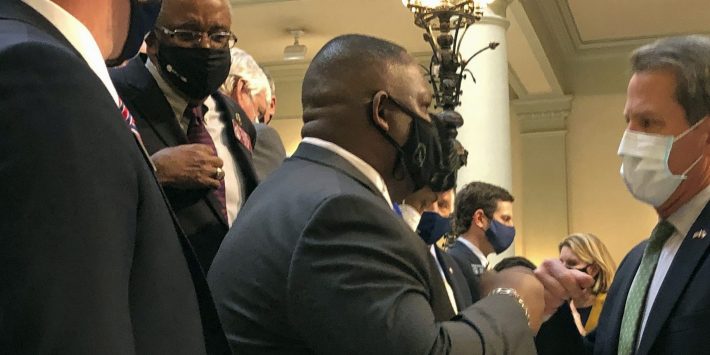Kemp Proposes Repeal Of Citizen’s Arrest Law Used To Defend Ahmaud Arbery’s Killing

Gov. Brian Kemp, right, bumps fists Tuesday with Democratic Rep. Carl Gilliard of Garden City at the state Capitol in Atlanta. Kemp announced a plan to abolish Georgia’s citizen’s arrest law, partly blamed in the 2020 shooting death of Ahmaud Arbery near Brunswick.
CreditJeff Amy / Associated Press
Nearly a year after the killing of Ahmaud Arbery in Brunswick, Gov. Brian Kemp released a bipartisan plan Tuesday to repeal the citizen’s arrest statute that was used to defend the men who chased and shot him.
“Ahmaud was a victim of a vigilante style of violence that has no place in Georgia,” Kemp said.
“In a national political climate where it often seems as if no one agrees on anything, I’m proud to say a bipartisan, wide-reaching group of individuals …supports this proposal.”
The global outrage after a video of Arbery’s death went viral prompted state lawmakers to make several promises of reform. That included passage of a hate crimes bill, which was pushed through in June, as well as elimination of the state’s citizen’s arrest statute.
State lawmakers have been studying the statute, which dates back to 1863, since the summer.
Kemp’s proposal would repeal the statute and replace it with specific language to provide for citizen detainment in very specific circumstances, to include shopkeepers who witness shoplifters and restaurant owners and employees who witness “dine and dash” customers.
Arbery, a Black man who was jogging at the time of his death, was denied justice for months after prosecutors cited the state law, which allows citizens to detain someone who commits a crime “if the offense is committed in his presence or within his immediate knowledge.”
There’s been no evidence Arbery committed any crime before Gregory and Travis McMichael and William “Roddy” Bryan chased him down a suburban Brunswick street before Travis McMichael shot him.
The three men, who are white, were arrested weeks after the video leaked and have remained in Glynn County jail as they await trial.
“In light of what happened, in light of the [Civil War-era] roots of this law in Georgia, in light of the fact that when you read the two sentences of this code section, side by side and realize that they don’t make any sense … in light of all those things, Georgia needs to be a leader on this issue,” said Republican state Rep. Bert Reeves, a floor leader for the governor and lead sponsor on the bill.
Reeves said most states have some form of the citizen’s arrest language on the books, and, to his knowledge, Georgia is among the first to address it.
The governor’s proposal, which would go into effect immediately, prohibits any use of force that is likely to cause death or great bodily harm unless in self-defense.
It also explicitly avoids addressing Georgia’s “stand your ground” law, which was not invoked in the Ahmaud Arbery case. But Arbery’s death has prompted renewed criticism of that law.
“There is no bill that you’re 100% happy with. But it is as good a bill as we could get and it does so much,” said Democratic state Rep. Al Williams.
He called stand your ground “awful” but a “separate fight that will live to fight again.”
The statute dates back to 1863 and Kemp committed to doing something about it during his January State of the State address, calling it “a law that is ripe for abuse and enables sinister, evil motives.”
The state’s two other top Republicans, Speaker of the House David Ralston and Lt. Gov. Geoff Duncan, have also both expressed support for the change, likely setting the stage for an easy path through the General Assembly.
“It would be an abdication of our responsibility if we had not touched citizen’s arrest early on in this legislative session,” said Democratic state Rep. Calvin Smyre. “I think this is a bold step. Citizen’s arrest is so antiquated. It’s another cloud over the state of Georgia that we need to get rid of, and it’ll make the state a better place.”
“Sometimes, you know, when you’re in a reflective mode, you look back and you say, how did we not do this earlier?” Smyre said. “And to me, you know, you just have to continue…just keep climbing.”